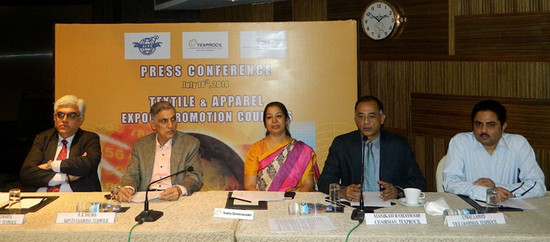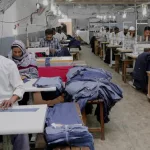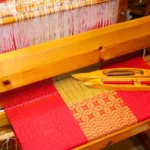The Cotton Textiles Export Promotion Council (Texprocil) – has recommended some initiatives to the Modi Government to increase India’s footprint in the global market to get the benefit of increased employment opportunities for the rural masses particularly the underprivileged and unskilled labour in the agriculture sector.
Texprocil has a membership of around 3,500 companies spread across major textile clusters in India. Its members are well established manufacturers and exporters of cotton textile products like Cotton, Yarns, Fabrics and Home Textiles, showcasing a dazzling array of products across the value chain.
Since its inception in 1954, as an autonomous, nonprofit body dedicated to promotion of exports, The Cotton Textiles Export Promotion Council, popularly known as TEXPROCIL™ has been the international face of cotton textiles from India facilitating exports worldwide. The Council connects international buyers with appropriate suppliers and facilitates interaction that enables them to source their specific needs. It also provides information on India’s competitive advantages, its export environment and updated position in the global market.
The Council enables better understanding of Indian and International trade policies, emerging trade issues, social and environmental compliances, quality management and sustainable business practices.
Export data for fiscal year 2013-14
Cotton Yarn – US$ 4.5 billion
Cotton Fabric – US$ 2.13 billion
Cotton Home textiles – US$ 4.79 bn
Indian Yarn and Made-up exports were impacted due to :
- Indian cotton prices remained higher than International Cotton prices since February. With cotton prices higher than international prices – 70 % of its sale value of yarn is Cotton cost – it is extremely difficult even for the highly efficient spinning sector to export its products.
- Home textiles exports got impacted as our main competitor (Pakistan) in our main market (EU) gained zero duty access, against 9.6% customs duty for products from India.
- Fabric exports has seen a small increase on a small base due to improved penetration into markets where India enjoys duty free access.
Texprocil’s recommendations to ensure growth in our exports as targeted US$ 13.5 billion :

(L-R) : Mr. S Rajagopal – Exec Director Texprocil, R.K. Dalmia – Deputy Chairman -Texprocil, Ms. Kiran Soni, Textile Commissioner, Manikram Ramaswami – Chairman Texprocil, Ujwal Lahoti – Vice Chairman Texprocil
Cotton Corporation of India (CCI) which is a well staffed cotton procurement and sales organization, which at present does support price operations must be mandated to use its reach and procure cotton during periods when Indian cotton is available cheaper than International prices and off load it at regular intervals whenever there is a threat of cotton prices breaching the international prices to Mills.
This will benefit farmers, as they will get higher prices during the harvest period. It will also benefit the mills as they will not be impacted by the large traders who use their holding capacity and ability to sell futures in NY market to cause the Indian prices to go over the international prices for 6 months each year.
CCI will be able to use its 600 strong human resource at all times and prove its worth by making commercial operations and profits. CCI will need to broad base its Board to include stake holders to give commercial wisdom. As of today one JS (Joint Secretary) and 3 executives paid by government alone are directors of a huge commercial organization.
In order to overcome the external barriers and restore a semblance of level playing field, the Foreign Trade Policy (FTP) should address the issues appropriately.
Foreign Trade Policy has 4 broad objectives :
- Maximize India’s forex earnings for a given incentive outflow.
- Create maximum number of jobs for a given incentive outflow.
- Incentivise exports of products/commodities that has head room to grow, incentives should increase exports and not merely add to the bottom line of exporters.
- Incentives should offset the extra freight costs incurred while exporting to distant markets.
On all four points, Cotton textile exports be it yarns , fabrics or ‘Cut and Sew’ deserve higher incentives than engineering exports, electronic assembled products like set up boxes, furniture , bicycles , two wheelers etc. as textiles has near zero import content, as against 25% to 90% import content in the above listed products. Textiles create 10 to 20 times more jobs than the listed products and that too in tier 3/4 locations for unskilled persons of both sexes.
Indian textile exports at the best is 10% in most markets and there is a 90% head room for growth should we become price competitive and displace our competitors from our neighbourhood.
Textiles have lower FOB value and therefore suffer higher logistic costs in % terms and therefore deserve a higher % as Focus Market incentives to offset the extra freight cost than listed products. However the reality is that the FTP is not implemented as per stated objectives and Textiles enjoy lowest instead of highest incentives. Texprocil wants the government to state the policy and follow it and not do just the opposite.
Following the policy with a logic of giving higher incentives where there is a lack of level playing field will go a long way to increase India’s exports per rupee given out as incentives.
Texprocil has proposed the following incentives for Yarns, Fabrics and ‘Cut and Sew’ (all to be notified at the 2/4 digit code level to prevent unintended exclusions) for different country groups based on a clearly articulated logic.
Texprocil’s request to the Government
Logic based incentives as opposed to Lobbying based but strictly in accordance to the stated objectives. This will substantially increase India’s exports and net foreign exchange earned besides creating a huge number (in lakhs) of additional jobs without increasing the overall outflow of incentives.





